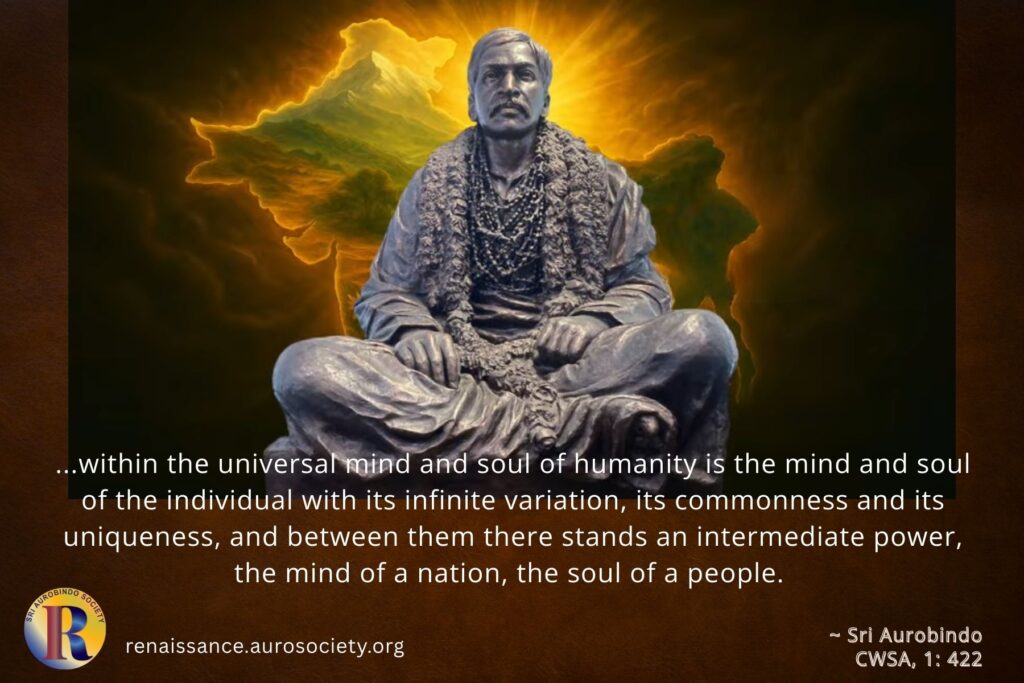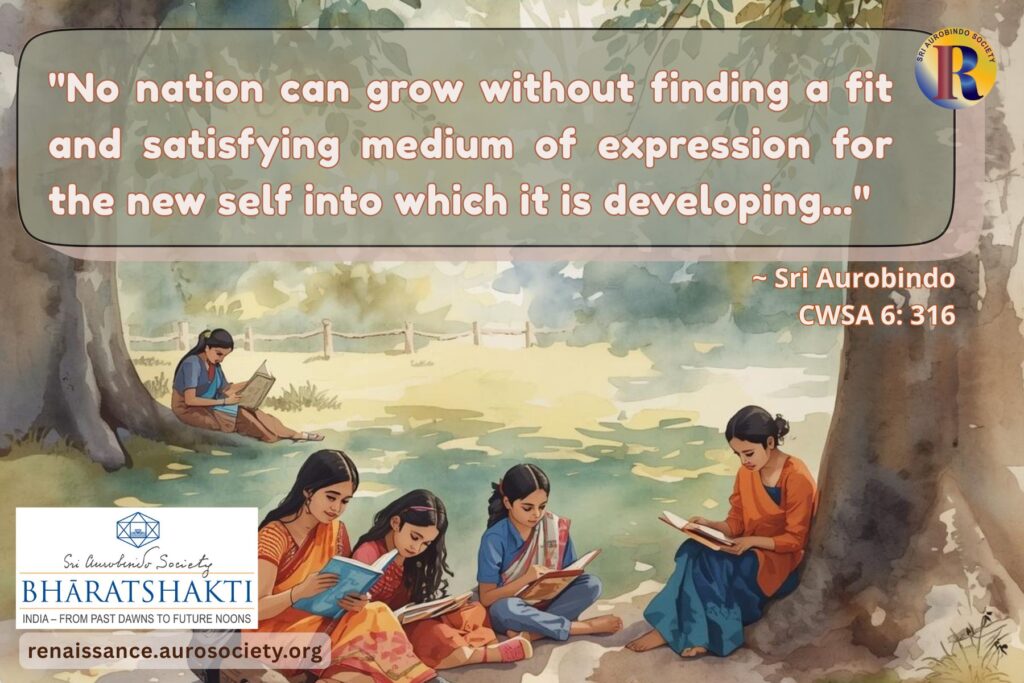Editor’s Note: For a large majority of the educated people who at some point in their lives turn to spiritual pursuit, reading spiritual literature becomes a big part of their process. What is the right place and significance of spiritual literature in the path of sadhana, can reading and reflecting on such literature help prepare the sadhak, can it become a hindrance?
We feature here some selections from Sri Aurobindo and the Mother where they explain for that for a sadhak, it is not sufficient to read spiritual literature and acquire knowledge. One must go beyond what is in the scripture to acquire the eternal knowledge. They also emphasize the need to practice what has been read.
We have made slight formatting changes without altering the original text.
🌸🌸🌸
Pass Beyond the Written Truth
For the sadhaka of the integral Yoga it is necessary to remember that no written Shastra, however great its authority or however large its spirit, can be more than a partial expression of the eternal Knowledge.
He will use, but never bind himself even by the greatest Scripture. Where the Scripture is profound, wide, catholic, it may exercise upon him an influence for the highest good and of incalculable importance.
It may be associated in his experience with his awakening to crowning verities and his realisation of the highest experiences. His Yoga may be governed for a long time by one Scripture or by several successively,—if it is in the line of the great Hindu tradition, by the Gita, for example, the Upanishads, the Veda. Or it may be a good part of his development to include in its material a richly varied experience of the truths of many Scriptures and make the future opulent with all that is best in the past.
But in the end he must take his station, or better still, if he can, always and from the beginning he must live in his own soul beyond the limitations of the word that he uses.
The Gita itself thus declares that the Yogin in his progress must pass beyond the written Truth,—śabdabrahmātivartate—beyond all that he has heard and all that he has yet to hear,—śrotavyasya śrutasya ca. For he is not the sadhaka of a book or of many books; he is a sadhaka of the Infinite.
– Sri Aurobindo (CWSA, Vol. 23, pp. 55-56)
***
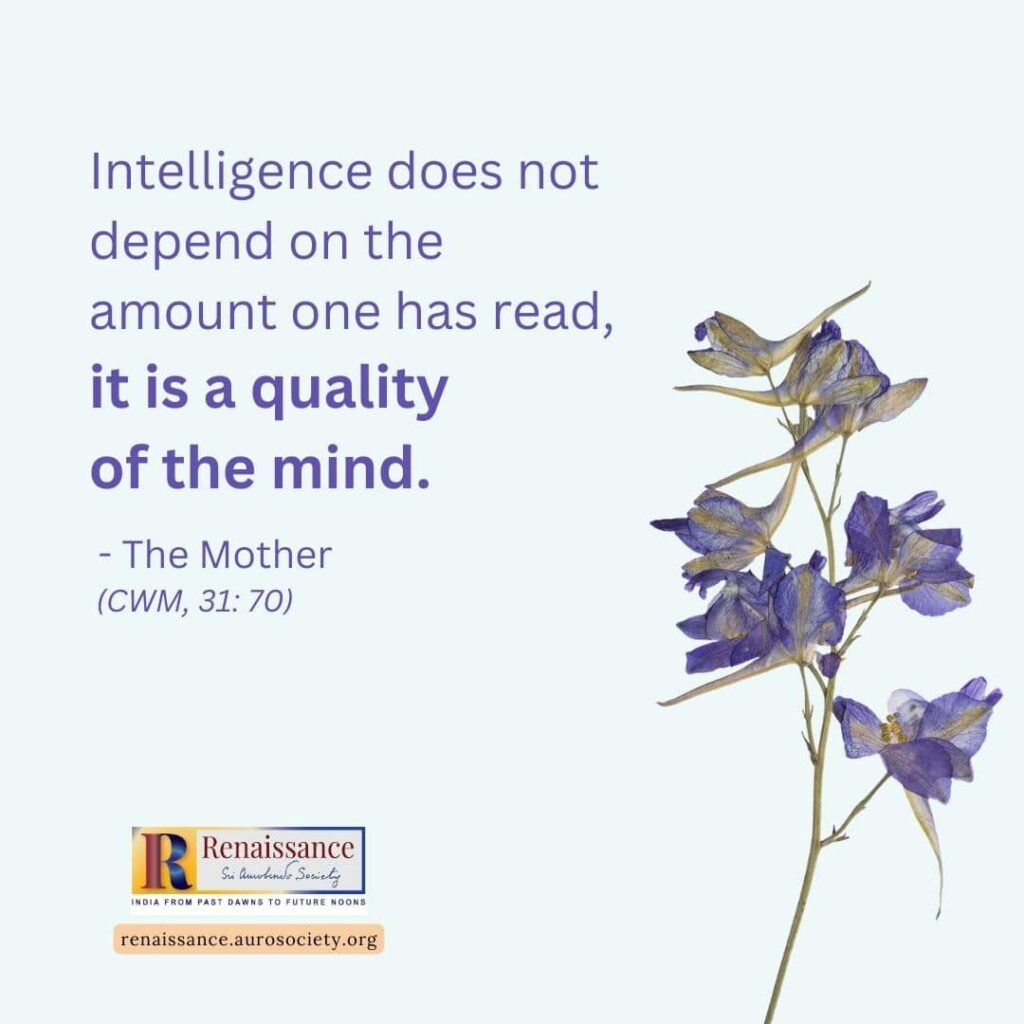
Reading of Books as Help in Sadhana
Reading good books can be of help in the early mental stage—they prepare the mind, put it in the right atmosphere—can even if one is very sensitive bring some glimpses of realisation on the mental plane. Afterwards the utility diminishes—you have to find the right knowledge and experience in yourself.
– Sri Aurobindo (CWSA, Vol. 31, p. 63)
***
Intelligence does not depend on the amount one has read, it is a quality of the mind. Study only gives it material for its work as life also does. There are people who do not know how to read and write well who are more intelligent than many highly educated people and understand life and things better.
On the other hand a good intelligence can improve itself by reading because it gets more material to work on and grows by exercise and by having a wider range to move in. But book knowledge by itself is not the real thing; it has to be used as a help to the intelligence, but it is often used only as a help to a loquacious stupidity or ignorance—ignorance because knowledge of facts is a poor thing if one cannot see their true significance.
– Sri Aurobindo (CWSA, Vol. 31, p. 70)
***
It is quite natural to want to meditate while reading Yogic literature—that is not the laziness. The laziness of the mind consists in not meditating when the consciousness wants to do so.
– Sri Aurobindo (CWSA, Vol. 29, p. 318)
***
When the passion for reading or study seizes hold of the mind, it is like that; one wants to spend all the time doing it. It is a force that wants to satisfy itself—like other forces—and takes hold of the consciousness for its purpose.
One has to utilise these forces without letting them take hold; for this there must be the central being always in control of the forces of Nature that come to it, deciding for itself the choice of what it shall accept, how use, how arrange their action. Otherwise each Force catches hold of some part of the personality (the student, the social man, the erotic man, the fighter) and uses and drives the being instead of being controlled and used by it.
– Sri Aurobindo (CWSA, Vol. 31, p. 62)
***
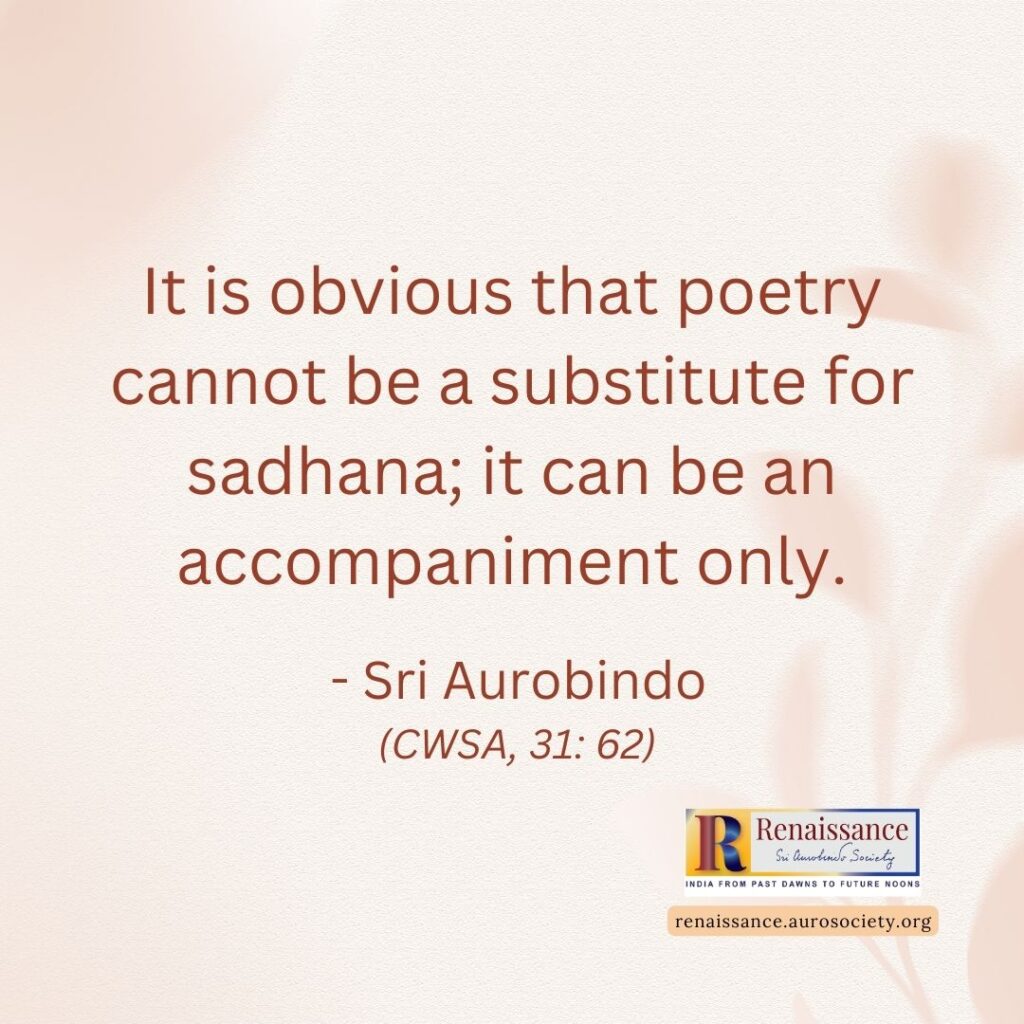
It is obvious that poetry cannot be a substitute for sadhana; it can be an accompaniment only.
If there is a feeling (of devotion, surrender etc.), it can express and confirm it; if there is an experience, it can express and strengthen the force of experience. As reading of books like the Upanishads or Gita or singing of devotional songs can help, especially at one stage or another, so this can help also. Also it opens a passage between the exterior consciousness and the inner mind or vital. But if one stops at that, then nothing much is gained.
– Sri Aurobindo (CWSA, Vol. 31, p. 78)
***
See:
“To read Savitri is indeed to practise Yoga.”
Dedication to the Divine [is the right attitude in reading]. To read what will help the Yoga or what will be useful for the work or what will develop the capacities for the divine purpose. Not to read worthless stuff or for mere entertainment or for a dilettante intellectual curiosity which is of the nature of a mental dramdrinking. When one is established in the highest consciousness, one can read nothing or everything: it makes no difference—but that is still far off.
– Sri Aurobindo (CWSA, Vol. 31, p. 63)
***
You can remember at the beginning and offer your reading to the Divine and at the end again. There is a state of consciousness in which only a part of it is reading or doing the work and behind there is the consciousness of the Divine always.
– Sri Aurobindo (CWSA, Vol. 31, p. 64)
***
Practice What You Read
It is a tale of ancient times, of what used to happen before there were printing presses and books, of the days when only the Guru or the Initiate had the knowledge and gave it only to those he considered worthy of having it. And for him, usually, “to be worthy of having it” meant putting into practice what one had learnt. He gave you a truth and expected you to practise it. And when you had put it into practice, he consented to give you another.
Now things happen quite differently.
Everybody and anybody can have a book, read it right through and he is quite free to practise it or not as he pleases. This is all very well, but it creates a certain confusion in many minds, and people who have read many books think that it is enough and that all sorts of miraculous things must happen to them because they have read books, and that they don’t need to take the trouble of practising. So they become impatient and say, “How is it that although I have read all this I am still just the same person, have the same difficulties, haven’t achieved any realisation?” I very often hear remarks of this kind.
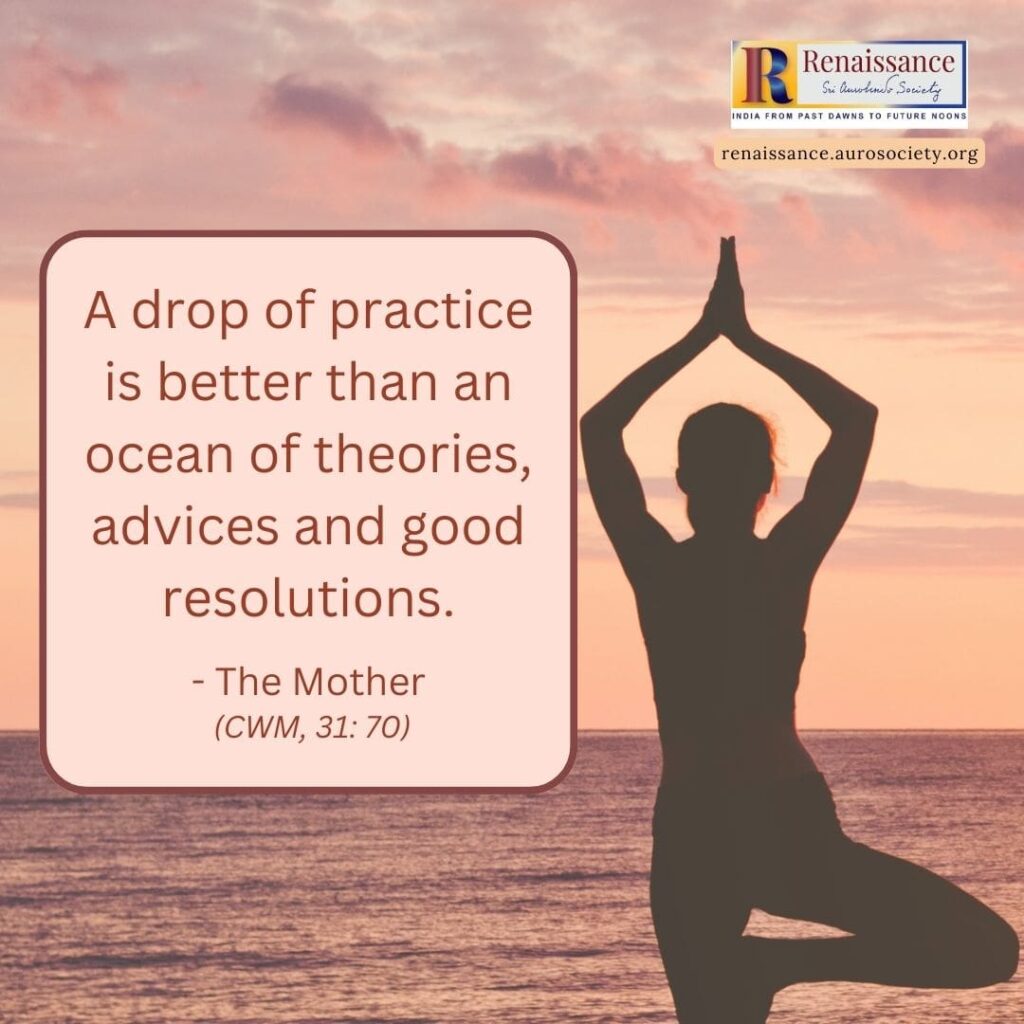
They forget only one thing, that they have obtained the knowledge—intellectual, mental knowledge—before having deserved it, that is, before having put into practice what they have read, and that, naturally, there is discrepancy between their state of consciousness and the ideas, the knowledge they can speak about at length but which they haven’t practised. . .
[The Mother then reads a story titled simply ‘A Story of Initiation.’ Read the story HERE.]
So, this is to tell you that you must not be impatient, that you must understand that in order to really possess knowledge, whatever it may be, you must put it into practice, that is, master your nature so as to be able to express this knowledge in action.
– The Mother (CWM, Vol. 9, pp. 67-71)
***
You seem to be very conscious already of what ought and ought not to be done, but with you the difficulty begins with putting it into practice. You should ask, not for more knowledge, but for the strength and courage to apply sincerely and scrupulously the little you already know.
– The Mother (CWM, Vol. 17, pp. 31)
***
It is not enough to know, you must practise.
It is not enough to pretend, you must be.
– The Mother (CWM, Vol. 14, pp. 208)
***
A drop of practice is better than an ocean of theories, advices and good resolutions.
– The Mother (CWM, Vol. 14, p. 208)
***
To listen is good, but not sufficient―you must understand.
To understand is better, but still not sufficient―you must act.
– The Mother (CWM, Vol. 14, p. 208)
***
It is good to read a Divine Teaching.
It is better to learn it.
The best is to live it.
– The Mother (CWM, Vol. 14, p. 209)
***
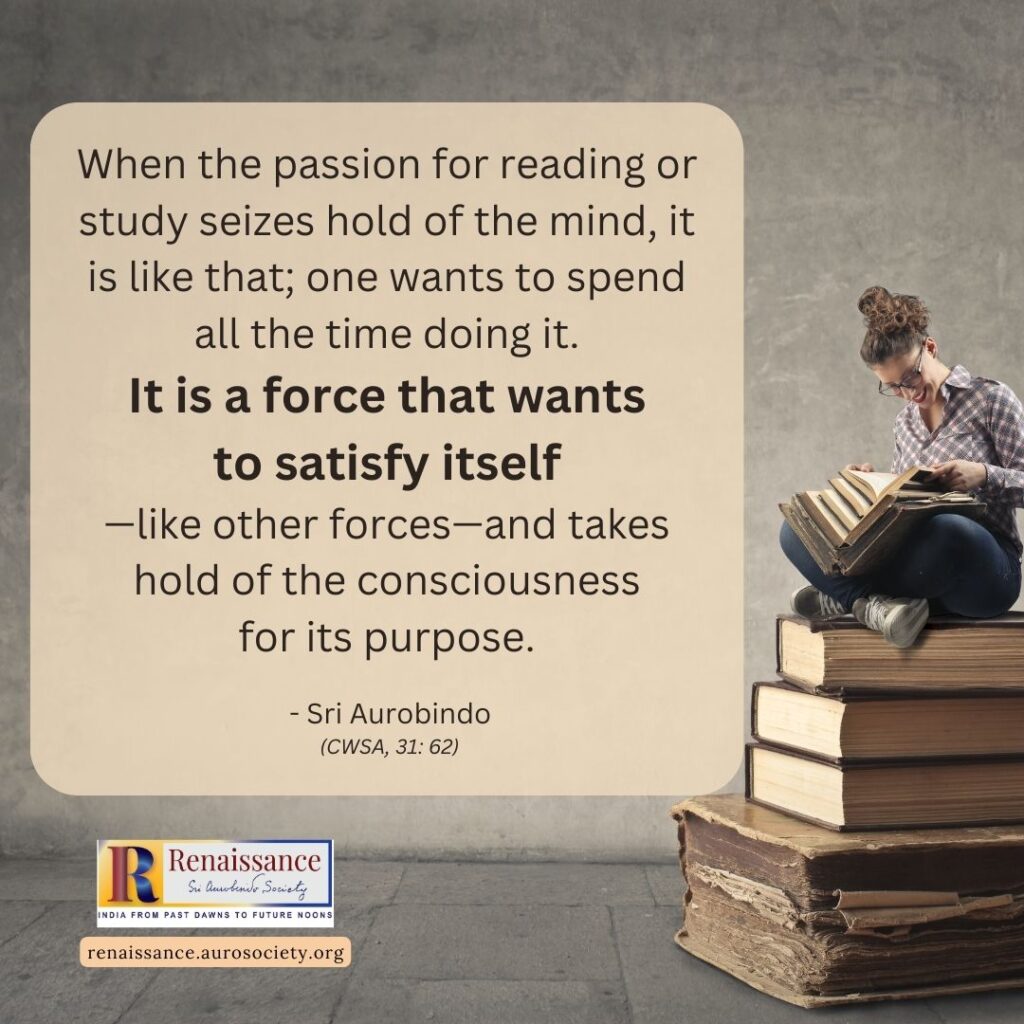
The opening text [of The Thousands] says that a single word that gives you peace is worth more than thousands of words that have no meaning—this anybody can understand—but it is also said that the word that gives you peace is worth more than thousands of words that can satisfy the mental activity but have no psychological effect on your being.
– The Mother (CWM, Vol. 3, pp. 228)
***
Shun the barren snare of an empty metaphysics and the dry dust of an unfertile intellectuality. Only that knowledge is worth having which can be made use of for a living delight and put out into temperament, action, creation and being.
– Sri Aurobindo (CWSA, Vol. 12, pp. 443)
🌸🌸🌸
Also read:
Literature and Progress on the Path
~ Design: Raamkumar

